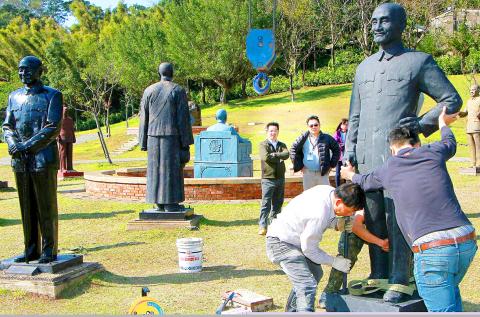Symbols of the Martial Law era and the former autocratic Chinese Nationalist Party (KMT) regime still abound, with 1,083 bronze statues of Chiang Kai-shek (蔣介石) located throughout Taiwan, an investigation by the Transitional Justice Commission showed.
In July, the commission issued an order to local governments to make an inventory of authoritarian symbols in public spaces.
It found that there are still 1,214 monuments depicting Chiang and his son, former president Chiang Ching-kuo (蔣經國), most of which are bronze statues.

Photo courtesy of the Yilan City Office
Of the 1,083 statues owned by government offices, the highest concentration is in Taipei, with 129 statues, followed by 98 in Taichung and 83 in Kaohsiung, the commission said.
The largest statue is the one at Taipei’s Chiang Kai-shek Memorial Hall.
The commission said that worshiping Chiang Kai-shek as a “great leader” continues to this day, with statues adorning places such as the Taiwan Police Academy, the National Immigration Agency and the Ministry of Justice’s Investigation Bureau.
The Veterans’ Affairs Agency and residences for retired veterans under the agency’s management house 46 Chiang Kai-shek statues, the commission said.
The inventory showed that 557 public spaces in Taiwan were named in memory of Chiang and his son, including 247 streets and roads were named “Zhongzheng” (中正), one of Chiang Kai-shek’s names.
The commission said the tradition of naming roads after Chiang Kai-shek started when the now-defunct Taiwan Provincial Executive Office in 1945 ordered all Japanese-sounding street and road names to be changed and instructed that priority be given to commemorate “the nation’s great figures,” which led to “Zhongzheng” roads and streets appearing in most municipalities.
Many statues of Chiang Kai-shek were erected following his death in 1975, after the KMT government issued a policy to erect statues for his “eternal veneration.”
When Chiang Ching-kuo died in 1988, the government amended the law to add his image and portraits to official policy to commemorate the nation’s deceased leaders.
This is the first time the government has conducted a comprehensive inventory of authoritarian symbols, the commission said, adding that it found a total of 145 schools nationwide named after Chiang Kai-shek or Chiang Ching-kuo, or 26 percent of all schools.
Officials said the report showed that the Chiang political cult still abounds throughout Taiwan even three decades after the lifting of Martial Law.
Cross-ministerial meetings and negotiations are necessary to remove or rename symbols of past KMT authoritarian rule, the officials said.

Taiwan’s Liu Ming-i, right, who also goes by the name Ray Liu, poses with a Chinese Taipei flag after winning the gold medal in the men’s physique 170cm competition at the International Fitness and Bodybuilding Federation Asian Championship in Ajman, United Arab Emirates, yesterday.

Costa Rica sent a group of intelligence officials to Taiwan for a short-term training program, the first time the Central American country has done so since the countries ended official diplomatic relations in 2007, a Costa Rican media outlet reported last week. Five officials from the Costa Rican Directorate of Intelligence and Security last month spent 23 days in Taipei undergoing a series of training sessions focused on national security, La Nacion reported on Friday, quoting unnamed sources. The Costa Rican government has not confirmed the report. The Chinese embassy in Costa Rica protested the news, saying in a statement issued the same

A year-long renovation of Taipei’s Bangka Park (艋舺公園) began yesterday, as city workers fenced off the site and cleared out belongings left by homeless residents who had been living there. Despite protests from displaced residents, a city official defended the government’s relocation efforts, saying transitional housing has been offered. The renovation of the park in Taipei’s Wanhua District (萬華), near Longshan Temple (龍山寺), began at 9am yesterday, as about 20 homeless people packed their belongings and left after being asked to move by city personnel. Among them was a 90-year-old woman surnamed Wang (王), who last week said that she had no plans

TO BE APPEALED: The environment ministry said coal reduction goals had to be reached within two months, which was against the principle of legitimate expectation The Taipei High Administrative Court on Thursday ruled in favor of the Taichung Environmental Protection Bureau in its administrative litigation against the Ministry of Environment for the rescission of a NT$18 million fine (US$609,570) imposed by the bureau on the Taichung Power Plant in 2019 for alleged excess coal power generation. The bureau in November 2019 revised what it said was a “slip of the pen” in the text of the operating permit granted to the plant — which is run by Taiwan Power Co (Taipower) — in October 2017. The permit originally read: “reduce coal use by 40 percent from Jan.